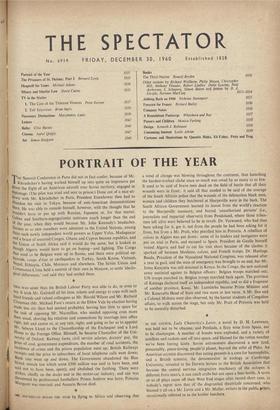PORTRAIT OF THE YEAR
THE Summit Conference in Paris did not in fact confer, because of Mr. , Khrushchev's having worked himself up into quite an impressive pet 4bout the flight of an American aircraft over Soviet territory, engaged in esPionage. (The pilot was tried and sent to prison.) Done out of a nice sit- clown with Mr. Khrushchev in Paris, President Eisenhower then had to abandon his visit to Tokyo, because of anti-American demonstrations there. He was able to console himself, however, with the thought that he Wouldn't have to put up with Russian, Japanese or, for that matter, Cuban and Southern-segregationist tantrums much longer than the end (1! the year, when they would become Mr. John Kennedy's headaches. Sixteen or so new members were admitted to the United Nations, among them such newly independent world powers as Upper Volta, Madagascar cind a brace of assorted Congos. Ghana and Cyprus became republics, and the Union of South Africa said it would do the same, but it looked as though Algeria would have to go on hoping—and fighting. The Congo (bat used to be Belgian went uti in flames, and there were political up- heavals, coups delat or earthquakes in Turkey, South Korea, Vietnam, , ,.,"ePal, Ethiopia, Chile, Morocco and elsewhere. The Soviet Union and Communist China held a summit of their own in Moscow, to settle 'ideolo- gical differences,' and said they had settled them.
* lins WAS MORE than the British Labour Party was able to do, or even to say. It took Mr. Gaitskell all his time, talents and energy to cope with such loyal friends and valued colleagues as Mr. Harold Wilson and Mr. Richard Crussman (Mr. Michael Foot's return at the Ebbw Vale by-election having made less stir than had seemed probable), leaving him little to spare for the task of opposing Mr. Macmillan, who needed opposing even more than usual, shoving his relatives and connections by marriage into office night, left and centre or, at any rate, right; and going so far as to appoint Mr. Selwyn Lloyd to the Chancellorship of the Exchequer and a Lord Home to the Foreign Office. Himself, he became Chancellor of the Uni- versity of Oxford. Railway fares, civil service salaries, doctors' pay, the Price of coal, government expenditure, the number of road accidents, the Incidence of crime and the prison population went up; British Railways receipts and the price to subscribers of local telephone calls went down; Rank rate went up and down. The Government abandoned the Blue Streak missile (on which some 000 million was said to have been, and said not to have been, spent), and abolished the farthing. There were Strikes, chiefly on the docks and in the motor-car industry, and one was threatened by professional footballers'. Prince Andrew was born; Princess Margaret was married; and Aneurin Bevan died.
* MACMILLAN BEGAN THE YEAR by flying to Africa and observing that
MR.
a wind of change was blowing throughout the continent, thus launching the hardest-worked clichd since so much was owed by so many to so few. It used to be said of brave men dead on the field of battle that all their wounds were in front: it said all that needed to be said of the courage of the South African police that the wounds of the defenceless black men, women and children they butchered at Sharpeville were in the back. The South African Government learned its lesson from the world's reaction to the Sharpeville massacre, and barred `unauthorised persons' (i.e., journalists and impartial observers) from POndoland, where those tribes- men left alive were believed to be in revolt. Dr. Verwoerd, who had thus been asking for it, got it, not from the people he had been asking for it from, but from a Mr. Pratt, who pistolled him in Pretoria. A rebellion of colons in Algiers was put down: some of its leaders and instigators were put on trial in Paris, and escaped to Spain. President de Gaulle himself visited Algeria and had to cut his visit short because of the clashes it sparked off between Moslems, colons, and French troops. Dr. Hastings Banda, President of the Nyasaland National Congress, was released after a year in gaol, and the state of emergency was brought to an end, but Mr. Jomo Kenyatta was still detained in Kenya. In the Congo, the new national army mutinied against its Belgian officers: Belgian troops marched out; UN troops marched in; Belgian troops marched back again. The province of Katanga declared itself an independent republic, and so did a fragment of another province, Kasai. Mr. Lumumba became Prime Minister and Mr. Kasavuhu Head of State and vice more or less versa. A Mr. Ileo and a Colonel Mobutu were also observed, by the keener students of Congolese affairs, to walk across the stage, but only Mr. Pratt of Pretoria was held to be mentally disturbed.
IN THE COURTS, Lady Chatterley's Lover, a novel by D. H. Lawrence, was held not to he obscene, and Perelada, a fizzy wine from Spain, not to be champagne. A number of bombs were exploded, and a variety of satellites and rockets sent off into space, and blamed for the rotten weather we've been having lately. Soviet astronomers discovered a new (and, presumably, peace-loving, people's) planet, beyond the orbit of Pluto. An American scientist discovered that eating peanuts is a cure for haemophilia, and a British scientist, the demonstrator in zoology at Cambridge University, revealed in his Darwin lecture to the British Association that because the central nervous integration machinery of the octopus is different from man's, it can catch crabs but not open a beer-bottle. A score or so of plays came off their West End stages after record short runs, to nobody's regret save that of the disgruntled theatricals concerned, who blamed it all on a Mr. Levin and a Mr. Muller, writers in the public prints, occasionally referred to as the kosher butchers.


































 Previous page
Previous page